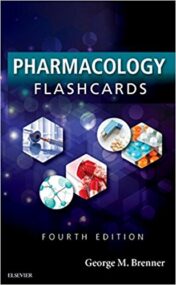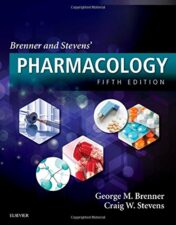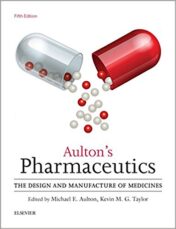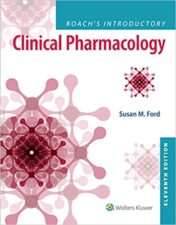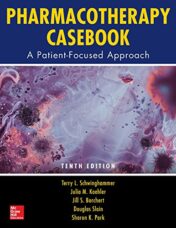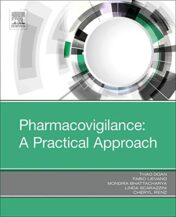Pharmacology Books
Pharmacology Books
Pharmacotherapy: A Pathophysiologic Approach, Tenth Edition (ORIGINAL PDF)
Pharmacology Books
Goodman and Gilman’s The Pharmacological Basis of Therapeutics, 13th Edition (ORIGINAL PDF)
Pharmacology Books
Pharmacology Books
Pharmacology Books
Aulton’s Pharmaceutics: The Design and Manufacture of Medicines, 5th Edition (EPUB+PDF)
Pharmacology Books
Roach’s Introductory Clinical Pharmacology, 11th Edition (EPUB+PDF)
Pharmacology Books
A Practical Guide to Contemporary Pharmacy Practice and Compounding, 4th Edition (EPUB+PDF)
Pharmacology Books
Winter’s Basic Clinical Pharmacokinetics, 6th Edition (EPUB+PDF)
Pharmacology Books
2018 Lippincott Pocket Drug Guide for Nurses, 6th Edition (EPUB+PDF)
Pharmacology Books
Pharmacology Books
Pharmacology Books
Pharmacology Books
Tarascon Pocket Pharmacopoeia 2017 Classic Shirt-Pocket Edition (PDF)
Pharmacology Books
The APRN’s Complete Guide to Prescribing Drug Therapy 2017 (EPUB+PDF)
Pharmacology Books
Pharmacotherapy Casebook: A Patient-Focused Approach, Tenth Edition (PDF)
Pharmacology Books
Pharmacology Books
Epigenetic Drug Discovery (Methods and Principles in Medicinal Chemistry)
Pharmacology Books
Pharmacology Books
Pharmacology Books
Pharmacology Books
Pharmacology Books
Pharmacology Books
Pharmacology Books
Pharmacology Books
Introduction
Are you looking to advance your knowledge in pharmacology? Look no further! Discover the Best Pharmacology Books to Advance Your Knowledge is here to help. This guide provides an overview of the top pharmacology books available, helping you to find the perfect book for your needs. Whether you are a student, professional, or just curious about the field, this guide will provide you with the information you need to make an informed decision. With detailed reviews and ratings, you can be sure to find the best pharmacology book for your needs.
Overview of Pharmacology Basics
Pharmacology is the study of drugs and their effects on living organisms. It is a branch of medicine that deals with the use of drugs to treat diseases, improve health, and prevent illness. Pharmacology basics involve understanding how drugs interact with the body, how they are metabolized, and how they affect different organs and systems.
The first step in pharmacology basics is to understand the different types of drugs. Drugs can be classified according to their chemical structure, their mechanism of action, or their therapeutic uses. Commonly used drugs include antibiotics, antifungals, antivirals, anti-inflammatory agents, analgesics, hormones, and vitamins. Each type of drug has its own unique properties and effects on the body.
Once the type of drug is determined, it is important to understand how it works. This includes understanding how the drug is absorbed, distributed, metabolized, and eliminated from the body. It also involves understanding the drug’s pharmacokinetics, which is the study of how the drug moves through the body and how it interacts with other drugs.
In addition to understanding the pharmacokinetics of a drug, it is also important to understand its pharmacodynamics. This is the study of how the drug affects the body and how it interacts with other drugs. This includes understanding the drug’s side effects, interactions with other drugs, and potential toxicity.
Finally, it is important to understand the clinical applications of a drug. This includes understanding how the drug is used to treat a particular condition, how it is administered, and what the expected outcomes are. It also involves understanding the risks associated with taking the drug, such as potential side effects and interactions with other drugs.
Pharmacology basics are essential for anyone who wants to understand how drugs work and how they can be used safely and effectively. Understanding these concepts can help healthcare professionals make informed decisions about prescribing and administering medications.
Understanding Drug Interactions and Side Effects
Understanding drug interactions and side effects is an important part of taking medications safely. Drug interactions occur when two or more drugs interact with each other, resulting in a change in the way one or both of the drugs work. Side effects are any undesired effects that may occur as a result of taking a medication.
Drug interactions can be dangerous because they can cause serious health problems. For example, if two drugs interact with each other, they may increase or decrease the effectiveness of one or both of the drugs, or they may cause unexpected side effects. It is important to understand how different drugs
Exploring the Latest Advances in Pharmacology
Pharmacology is the study of drugs and their effects on living organisms. It is a rapidly evolving field, with new advances being made every day. The latest advances in pharmacology are helping to improve the quality of life for people around the world.
One of the most exciting recent developments in pharmacology is the development of personalized medicine. This approach uses genetic information to tailor treatments to individual patients. By understanding a patient’s unique genetic makeup, doctors can create treatments that are more effective and have fewer side effects. This has the potential to revolutionize the way we treat diseases and could lead to better outcomes for patients.
Another major advance in pharmacology is the use of nanotechnology. Nanoparticles are tiny particles that can be used to deliver drugs directly to specific cells or tissues. This allows for more precise targeting of drugs, which can reduce side effects and increase effectiveness. Nanoparticles can also be used to deliver drugs to hard-to-reach areas of the body, such as the brain or the eye.
The use of artificial intelligence (AI) is also becoming increasingly important in pharmacology. AI can be used to analyze large amounts of data quickly and accurately. This can help researchers identify new drug targets and develop more effective treatments. AI can also be used to monitor patients and detect any changes in their condition, allowing for early intervention.
Finally, 3D printing is being used to create custom-made drugs. This technology allows for the creation of drugs tailored to an individual’s needs. It can also be used to create drugs that are not available commercially. This could open up new possibilities for treating rare diseases and other conditions.
These are just a few of the latest advances in pharmacology. As research continues, we can expect to see even more exciting developments in the years to come.
Investigating the Role of Pharmacology in Disease Treatment
Pharmacology is the study of drugs and their effects on living organisms. It is a branch of medicine that focuses on the use of drugs to diagnose, prevent, and treat diseases. Pharmacology plays an important role in disease treatment by providing physicians with the knowledge and tools necessary to effectively manage and treat patients.
The primary goal of pharmacology is to understand how drugs interact with the body and how they can be used to treat various diseases. To do this, pharmacologists must first identify the active ingredients in a drug and then determine how those ingredients interact with the body’s systems. This includes understanding how the drug is absorbed, distributed, metabolized, and eliminated from the body. Once these processes are understood, pharmacologists can then develop strategies for using the drug to treat a particular disease.
In addition to understanding the pharmacokinetics of a drug, pharmacologists also investigate the pharmacodynamics of a drug. This involves studying how the drug affects the body’s physiology and biochemistry. For example, pharmacologists may study how a drug affects the activity of certain enzymes or hormones, or how it interacts with receptors in the body. By understanding the pharmacodynamics of a drug, pharmacologists can develop more effective treatments for various diseases.
Pharmacology also plays an important role in drug safety. Pharmacologists must evaluate the potential side effects of a drug before it is approved for use. They must also monitor the safety of a drug after it has been approved and make sure that it is being used correctly. This helps ensure that patients receive the most effective and safest treatment possible.
Overall, pharmacology plays a vital role in disease treatment. By understanding the pharmacokinetics and pharmacodynamics of a drug, pharmacologists can develop more effective treatments for various diseases. In addition, pharmacologists help ensure that drugs are safe and used correctly. Through their research and expertise, pharmacologists help improve the quality of life for millions of people around the world.
Examining the Impact of Pharmacology on Public Health
Pharmacology is the study of drugs and their effects on the body. It is a vital component of public health, as it helps to ensure that medications are safe and effective for use in treating various diseases and conditions. Pharmacology has had a major impact on public health, both in terms of improving access to medications and in helping to reduce the risk of adverse drug reactions.
The development of new drugs has been essential in improving public health. Many of the most common medications used today were developed through pharmacological research. These drugs have helped to treat a wide range of illnesses and conditions, from cancer to heart disease. They have also enabled people to manage chronic conditions such as diabetes and asthma more effectively. In addition, many of these drugs have been instrumental in reducing the spread of infectious diseases, such as HIV/AIDS.
Pharmacology has also played an important role in improving access to medications. By understanding how drugs interact with the body, pharmacologists have been able to develop more effective and affordable treatments. This has allowed more people to receive the medications they need, regardless of their financial situation. In addition, pharmacology has helped to reduce the cost of medications by making them more widely available.
Finally, pharmacology has helped to reduce the risk of adverse drug reactions. By studying the effects of different drugs on the body, pharmacologists have been able to identify potential side effects and interactions between medications. This has enabled doctors to prescribe medications more safely and effectively, reducing the risk of serious complications.
Overall, pharmacology has had a significant impact on public health. By developing new drugs, improving access to medications, and reducing the risk of adverse drug reactions, pharmacology has helped to improve the lives of millions of people around the world.
Conclusion
In conclusion, pharmacology books are an invaluable resource for anyone looking to advance their knowledge in the field. Whether you’re a student, a healthcare professional, or just someone interested in learning more about pharmacology, there is a book out there that can help you reach your goals. With so many options available, it can be difficult to know which books are the best. Fortunately, this article has provided a comprehensive list of the top pharmacology books to help you make an informed decision.

